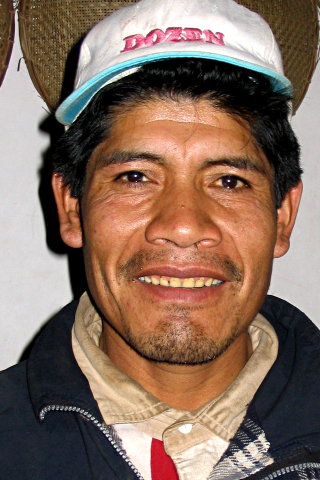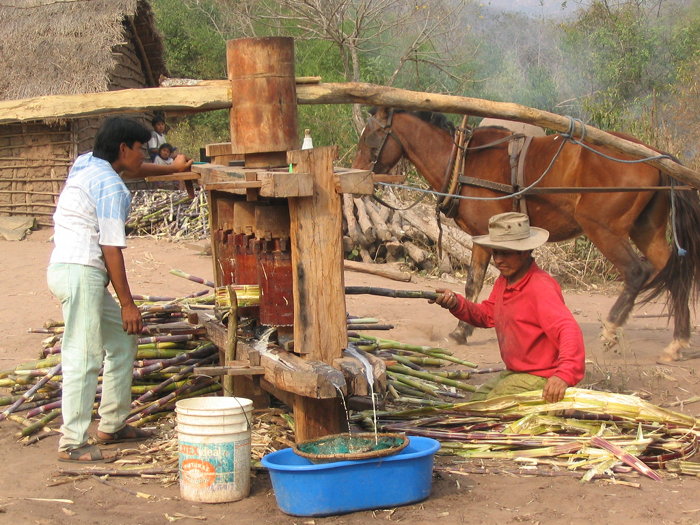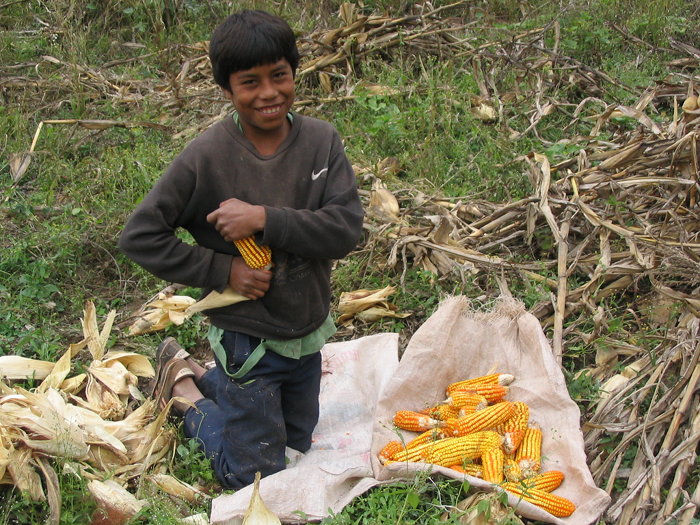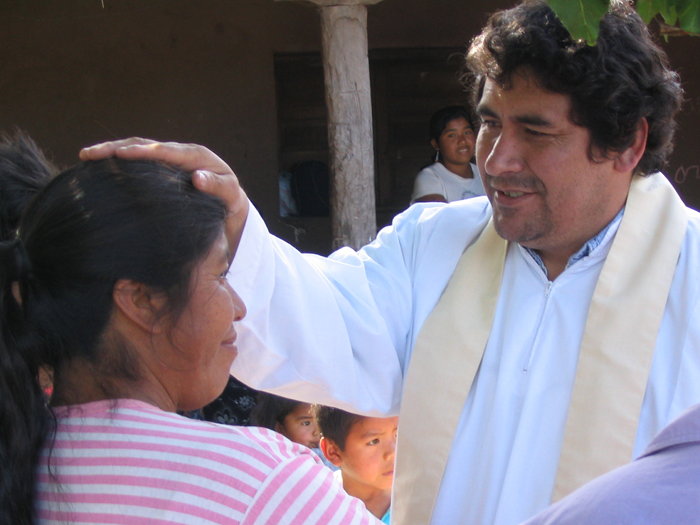Cañón del Ingre, Chuquisaca
25 December 2001
Season’s Greetings from Imi.
Garrison Keilor claimed a few years ago that there are just four Crowning Pleasures in life. The first, he said, is Walking with God.
Padre Raúl serves about 70 tenuously connected Chuquisaca towns and villages, and we’re lucky if he can make it to Imi even once a year. It was therefore something of an event when he arrived a few months back, accompanied by three guitar-wielding urban teenagers. Everyone in the community (so-called “Imeños”) showed up scrubbed, combed, and polished, wearing their good clothes and hats. The Padre hopped out of the jeep and greeted us expansively in Guaraní.

Don Claudo Pinto
“Poama! Kërai peï reta? Keti ndekañi?” (It morning! How you all are? Where lost yourself?)
His mastery of the language isn’t much better than mine, but everyone appreciated that he was willing to make a fool of himself. When it came to mass, however, there was no fooling around: he asked the community mburuvicha (captain), Don Claudio, to translate.
Claudio is the natural choice. A born leader, tall and dashing, with a quick, toothy smile, he is by far the most garrulous person in Imi. Visitors often ask him to translate. But he is also well-known for embroidering: stretching even two-word sentences into full-scale harangues, complete with irreverent jokes and irrelevant requests for clarification. He is famous for championing Guaraní polytheism, once he gets going. Even so, this was the representative of God standing next to him, and it was a singular and intimidating responsibility.
“En el nombre del Padre, del Hijo, y del Espíritu Santo ...” began the priest.
“Yanderu” (our Father), Claudio whispered humbly into the floor.
“Yanderu”, he whispered. Like many people who live close to the land, perhaps, my neighbors here own a remarkable spirituality that has little to do with the Bible (most are functionally illiterate), Protestant missionaries (who have not yet discovered the Cañón del Ingre), or even their own vaguely remembered traditions. It is neither philosophical nor consistent. But God, in whatever form, is as real as a tree to Don Claudio, and just as present in his life. I don’t know whether I walk with God, but I do Keilor one better: every day I walk with Imeños.
The second of Keilor’s pleasures is Learning. If I’ve done nothing else this past year, I have learned what it means to be a farmer, and what it means to be a Guaraní farmer with limited resources, in the Cañón del Ingre. I have an awful lot to learn, but I also have many fine teachers.
I have learned the joy of getting up before light, working long days throwing a heavy hoe in the hot tropical sun, coming home so tired that it is simply more than I can do to get a small supper together, and cooking anyway because without food I won’t be able to repeat the process tomorrow. I’ve learned what it is to be desperate for rain that does not come. I have learned the joy of clearing land, plowing, harrowing, and planting, and watching my work transform into straight, gapless lines of gorgeous little fist-sized peanut plants. They stuck their collective middle-finger at the drought which was killing off the corn and even the weeds in the fields around them. And I’ve learned to admire them one afternoon, and return the next day to find that pigs have gotten in somehow and shorn each and every single plant to the ground. I have learned the importance of rain and good fencing. I have learned to hate pigs.
My work with horses has been no less instructive. One, who I named “Pochi” (‘angry’, ‘mean’, and ‘excellent’) is not a nice horse. He once spun around and kicked me so hard in the thigh I limped for two weeks. Much worse, by comparison, another (called “Tuerto”) tripped over his rope and blinded himself; we didn’t know what to do with him and he must have been at a similar loss, because he refused all food, water, and corn for six weeks. Eventually he had to go where the grass is sweetest, and I learned how to dig a deep, horse-sized grave before the buzzards arrived. But I’ve also learned to train horses to work as a team and do as I ask. Putting their speed, power, and coordination to work is extraordinarily rewarding. Despite everything, I’ve become very fond of Pochi (he is a willing and tireless worker), and the others, Ndechi, Pisafuego, and Yasi, are absolute sweethearts.

Pisafuego and Don Ernesto pressing cane.
Keilor says the third Pleasure is the one most people think of first when they think of pleasure. I don’t know for certain what he’s referring to. In any case, the fourth Pleasure, he says, is sweet corn. (And three out of four ain’t bad.)
Community workdays in Imi start with a handful of men sitting on the ground, smoking home-grown tobacco and chewing coca. This is how Guaraní traditionally acknowledge the ‘iya’ (spirit owners of the forest and the corn) and get permission to work the land. No one is really thinking about iya right now, however. Don Ernesto and Don Abel talk about how and when to plant sweet potatoes. The rest of us enjoy the quiet, the blue sky, and the way last night’s frost is slowly receding as dawn peaks through the mountains. Then we get to work.
Everyone sets out across the field, hauling down the dry stalks two rows at a time and snapping off the corn. (Okay sea lawyer, it’s not really sweet corn.) It takes strength and a clever twist: done right the ears pop out of their sheathes like watermelon seeds. Don Benito tries to teach me but I’m a slow learner and soon lag behind. My hands ache, too, though this “soft” corn doesn’t shred them like the “hard” corn will, tomorrow. Finally reaching the far trees, we turn around and harvest another two rows back, leaving neat plaits and scattered small heaps of corn behind us.
By nine, we’ve finished a hectare and turn to shelling the corn under a huge, leafless tree in the middle of the field. An hour later, many women have joined us. The sun is fierce and flies bite my ankles. First, we stab the ear open with a thumb or a sharp stick, and then fling the husk over our shoulders. Next, we pinch or wrench the hard grain off the cob and pile it on a huge blue tarp. I watch Doña Flora’s hands wistfully; I’m using a phillips head for husking, but she still gets through twice as much corn as I do.
Just past noon, Doña Marta leads in a train of women, each balancing a plastic bucket of mbaipi (thick, tasteless corn and bean soup) on her head. By two, school is out and the kids join us. Most of the community (eighty or ninety people) is now here: gathering, husking, bagging, playing, swapping stories, and laughing. Girls parade tiny babies about on their hips. Young Silvio has stuffed two of his little brothers, and a fair amount of corn, into a grain sack. We work hard, but the mood is festive and our mountain of gold gets bigger and bigger.

Silvio Llorenti (on another occasion)
Gold indeed. This land has been fallow for a decade, and it cost us weeks of machete and axe work last year to wrest it back from the forest. The pay-off is gorgeous grain and a locally impressive yield of four tons per hectare. Prices are not as healthy, having fallen 30% since last year. All the same, this and the eleven remaining hectares we’ll harvest in the coming weeks represent the community’s entire yearly budget. It will cover school, store, and health costs, loans and interest, marriage and birth certificates, and new sandals for everyone.
The heaviest work comes as the sun sinks and the cold returns. We hoist the hundred pound bags of corn on our shoulders and carry them five kilometers back to the village, along a steep and narrow path through the mountains. Women and children carry less, but I notice Alvaro, who is eight, has at least 40 pounds on his back. It’s a trip we’ll all make many times. I’m thinking it’s also one chore where I can finally hold my own, until Faustino and Anastasio shout their greetings as they pass by; they’re racing each other, practically running. “Ipoi, no?” (Too heavy for ya?)
The Guaraní tradition of planting common fields was all but lost in the century of their peonage. Its resumption in new independent communities like Imi has been a bumpy process. Large families expend more effort on their own parcels, and have less time for the community. Others resent the imposition, or don’t feel the benefits justify the extra labor. For me though, frost and coca, aching hands and backs, lukewarm mbaipi, a hundred people working and laughing under a tree, Silvio’s brothers in a sack, and mountains of red and yellow corn on a blue tarp, are worth any trouble.

Padre Raúl, baptising Doña Flora Cerezo
By Keilor’s standards and international events notwithstanding (see my parents’ Christmas letter), 2001 was pretty pleasurable for me. Here’s wishing us all a new year close to God, full of learning, alive with love (in whatever form you may find it), and with plenty of good sweet corn.
./James (Phineas)